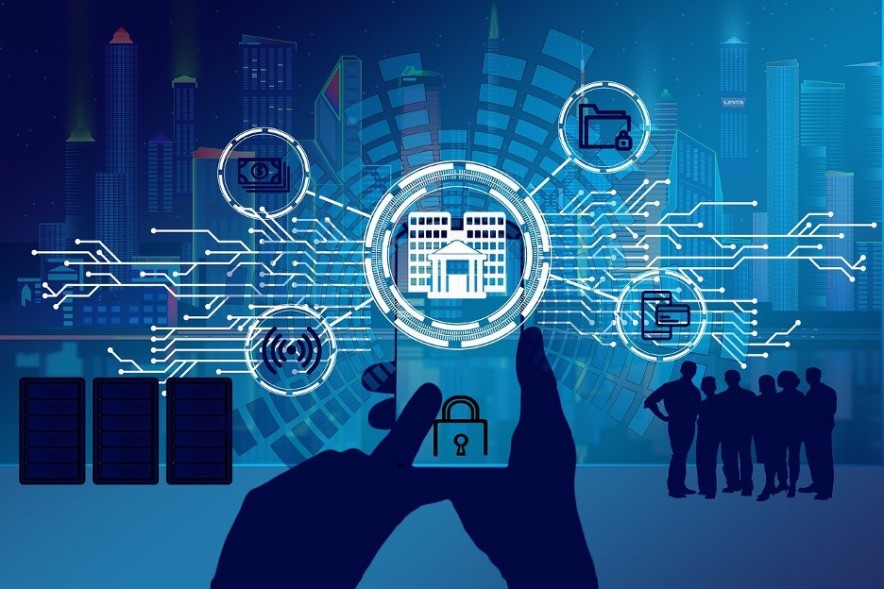
In an increasingly digitized world, the concept of trust has undergone a profound transformation. Traditional mechanisms of trust, rooted in centralized institutions and intermediaries, are being challenged by new paradigms enabled by blockchain technology.
Often hailed as the cornerstone of the fourth industrial revolution, blockchain offers a decentralized approach to building trust and transparency, fundamentally reshaping industries and economies across the globe. Despite its growing significance, blockchain remains a concept shrouded in mystery for many.
Seasoned analysts and strategists at the global digital asset consulting firm Kenson Investments believe blockchain has the power to unravel new opportunities and drive positive change on a global scale, especially with ongoing innovation and collaborations across industries.
Whether you’re new to the game or want to explore new avenues as you navigate the complex world of digital assets, call DeFi consultants at Kenson Investments for tailored advice. Keep reading to learn everything you need to know to appreciate the ‘invisible ledger’s’ transformative power and potential impact to revolutionize transactional processes, record-keeping, data security, and trust in the digital age.
What is Blockchain Technology?
Blockchain technology originated with the invention of Bitcoin in 2008 by an individual or group under the pseudonym Satoshi Nakamoto. Bitcoin introduced the concept of a decentralized digital currency underpinned by a distributed ledger known as the blockchain.
Blockchain functions via the invisible ledger, a distributed database that records transactions in a secure, transparent, and immutable manner without the need for intermediaries.
Each transaction is grouped into a “block” and cryptographically linked to the previous block, forming a chronological chain of blocks, hence the name “blockchain.” This immutable chain of blocks serves as a tamper-proof record of transactions, ensuring transparency and trust in the absence of a central authority.
Unlike traditional centralized databases controlled by a single entity, blockchain operates on a network of computers or nodes, where each node maintains a copy of the entire ledger. This decentralized architecture ensures that no single point of failure exists, making blockchain resistant to censorship, tampering, and unauthorized modifications.
Blockchain achieves consensus among network participants through various mechanisms, with the most common being proof-of-work (PoW) and proof-of-stake (PoS). PoW requires miners to solve complex mathematical puzzles to validate transactions and add new blocks to the blockchain, while PoS selects validators based on the amount of cryptocurrency they hold and are willing to “stake” as collateral.
Key Features of Blockchain Technology
Immutability
Once a transaction is recorded on the blockchain, it cannot be altered or tampered with. This immutability is achieved through cryptographic hashing, which generates a unique identifier for each block based on its contents. Any attempt to modify a block would require changing all subsequent blocks, making tampering practically impossible.
Decentralization
Unlike traditional centralized systems where a single entity controls the flow of information, blockchain operates on a decentralized network of nodes. This decentralized architecture eliminates the need for intermediaries and reduces the risk of single points of failure, making the system more resilient and censorship-resistant.
Transparency
Blockchain networks are transparent by design, allowing all participants to view and verify transactions in real-time. Every node in the network maintains a copy of the blockchain, ensuring that changes are visible to all stakeholders. This transparency fosters trust and accountability, reducing the risk of fraud and manipulation.
Security
Cryptographic techniques such as hashing and digital signatures ensure the security and integrity of data stored on the blockchain. Transactions are cryptographically secured, making it computationally infeasible to alter or forge transaction records.

Beyond Cryptocurrency: Exploring Diverse Applications
While Bitcoin popularized blockchain technology, its applications extend far beyond cryptocurrency. The versatility of blockchain lies in its ability to provide trust and transparency in a wide range of use cases, from supply chain management to identity verification, voting systems, and beyond.
Supply Chain Management
Blockchain technology revolutionizes supply chain management by providing end-to-end visibility and traceability of products, from raw materials to finished goods. By recording every transaction on a transparent and immutable ledger, blockchain enhances accountability, reduces counterfeiting, and ensures the authenticity and quality of products.
Through blockchain, consumers can trace the origins of products, verify their authenticity, and confirm ethical and sustainable practices in production and distribution. For example, in the food industry, blockchain enables the tracking of perishable goods, ensuring compliance with food safety regulations and minimizing the risk of contamination or spoilage.
Identity Management
Traditional identity systems are fragmented, insecure, and prone to data breaches and identity theft. Blockchain offers a decentralized and secure solution for managing digital identities, providing individuals with greater control and privacy over their personal information.
Blockchain-based identity systems enable self-sovereign identities, where individuals retain ownership and control of their identity data. By storing identity information on a blockchain, users can selectively disclose relevant attributes without exposing sensitive data, enhancing security and privacy in digital interactions.
Smart Contracts and Decentralized Applications (dApps)
Smart contracts, self-executing agreements coded on a blockchain, automate and enforce the terms of a contract without the need for intermediaries. By leveraging blockchain’s immutable and transparent nature, smart contracts ensure trust and security in business transactions, eliminating the need for costly and time-consuming legal processes.
Decentralized applications (dApps) leverage blockchain technology to create transparent, tamper-proof, and censorship-resistant platforms for various purposes, including finance, gaming, social networking, and more. Ethereum, a blockchain platform known for its support of smart contracts, has catalyzed the development of a thriving ecosystem of dApps across diverse industries.
Voting Systems
Blockchain technology holds the potential to transform voting systems, making elections more transparent, secure, and accessible. By recording votes on a blockchain, election results become verifiable and tamper-proof, mitigating risks of fraud, manipulation, and coercion. Blockchain-based voting systems also enable remote and mobile voting, increasing participation and inclusivity in democratic processes.
Envisioning the Future: Blockchain’s Potential Impact
As blockchain technology continues to evolve and mature, its potential impact on society and the global economy becomes increasingly apparent. From enhancing trust and transparency to fostering innovation and economic empowerment, blockchain has the potential to reshape industries, redefine business models, and revolutionize the way we interact and transact in the digital age.
Financial Services and Banking
In the financial services sector, blockchain promises to disrupt traditional banking and payment systems by enabling faster, cheaper, and more efficient transactions. Decentralized finance (DeFi) platforms leverage blockchain to offer a wide range of financial services, including lending, borrowing, trading, and asset management, without the need for intermediaries.
Blockchain-based cryptocurrencies and stablecoins provide alternatives to traditional fiat currencies, offering greater accessibility, security, and financial inclusion, particularly in regions with limited access to banking services. Central banks and financial institutions are exploring the potential of blockchain technology to issue digital currencies (CBDCs), enhancing the efficiency and resilience of monetary systems.
Healthcare and Pharmaceuticals
In healthcare and pharmaceutical industries, blockchain technology enhances data security, interoperability, and transparency, facilitating the secure storage and sharing of patient records, clinical trials, and supply chain information. By maintaining an immutable and auditable record of medical data, blockchain improves data integrity, reduces errors, and enhances patient privacy.
Blockchain enables the tracking and authentication of pharmaceutical products throughout the supply chain, combating counterfeit drugs, ensuring regulatory compliance, and enhancing patient safety. Additionally, blockchain-based platforms facilitate the sharing of medical research and patient data, accelerating innovation and collaboration in healthcare research and development.
Energy and Sustainability
Blockchain technology holds promise in the energy sector, enabling decentralized and transparent management of energy resources, grid infrastructure, and carbon emissions. Through blockchain-based platforms, consumers can trade renewable energy directly with each other, bypassing traditional utility companies and reducing reliance on fossil fuels.
Blockchain enables the creation of transparent and auditable systems for tracking and verifying carbon credits, emissions reductions, and renewable energy certificates, fostering greater accountability and incentivizing sustainable practices. Smart contracts on blockchain facilitate peer-to-peer energy trading, demand response, and grid optimization, contributing to a more resilient, efficient, and sustainable energy ecosystem.
Governance and Public Services
Blockchain technology has the potential to revolutionize governance and public services by increasing transparency, accountability, and citizen engagement. Blockchain-based voting systems ensure the integrity and security of elections, reduce fraud and manipulation, and enable greater participation and inclusivity in democratic processes.
Blockchain also facilitates the transparent and efficient delivery of public services, such as identity management, land registration, and social welfare programs. By digitizing and decentralizing government services, blockchain reduces bureaucracy, corruption, and inefficiency, empowering citizens and enhancing trust in public institutions.
Challenges and Considerations

Scalability and Interoperability
Scalability remains a significant challenge for blockchain technology, particularly in public blockchain networks with limited transaction throughput and high latency.
Solutions such as layer-two protocols, sharding, and off-chain scaling aim to improve scalability without compromising security or decentralization.
Additionally, interoperability standards and protocols enable seamless communication and interaction between different blockchain networks and platforms, fostering greater connectivity and usability.
Regulatory and Legal Frameworks
Regulatory uncertainty and legal frameworks vary across jurisdictions, impacting the adoption and growth of blockchain technology and cryptocurrencies.
Clear and coherent regulations are essential to provide certainty and confidence to businesses, investors, and consumers while ensuring compliance with anti-money laundering (AML), know-your-customer (KYC), and other regulatory requirements.
Environmental Impact
The energy consumption of blockchain networks, particularly those based on proof-of-work (PoW) consensus mechanisms, raises concerns about their environmental impact and carbon footprint.
Efforts to improve energy efficiency and transition to more sustainable consensus mechanisms, such as proof-of-stake (PoS) and delegated proof-of-stake (DPoS), are essential to mitigate environmental concerns and promote the long-term sustainability of blockchain technology.
Privacy and Security
While blockchain offers transparency and immutability, privacy and security remain paramount concerns, particularly in applications involving sensitive data and personal information.
Privacy-preserving technologies, such as zero-knowledge proofs, homomorphic encryption, and secure multi-party computation, enhance privacy and confidentiality on the blockchain without compromising transparency or auditability.
Additionally, robust cybersecurity measures and best practices are essential to protect against hacking, data breaches, and malicious attacks on blockchain networks and applications.
Leverage The Transformative Potential Of Blockchain Technology With The Leading Digital Asset Consulting Experts
Whether you’re exploring blockchain adoption for your business or investing in blockchain-based projects, leading digital asset consulting experts at Kenson Investments offer ongoing support and monitoring, helping you navigate market fluctuations, adjust your investment strategy as needed, and seize new opportunities as they arise.
Set up a consultation to play your part in building a more transparent, secure, and inclusive world powered by the invisible ledger of blockchain technology.
About the Author
Sarah Johnson is a seasoned financial analyst specializing in derivatives trading within the digital asset space. With over a decade of experience, she offers valuable insights to navigate cryptocurrency investments. Committed to professionalism and clarity, Sarah helps clients achieve their financial goals with confidence, leveraging her expertise in blockchain technology and financial markets.
Disclaimer: The content provided on this blog is for informational purposes only and should not be construed as financial advice. The information presented herein is based on personal opinions and experiences, and it may not be suitable for your financial situation. We strongly recommend consulting with a qualified financial advisor or professional before making any financial decisions. Any actions you take based on the information from this blog are at your own risk.




